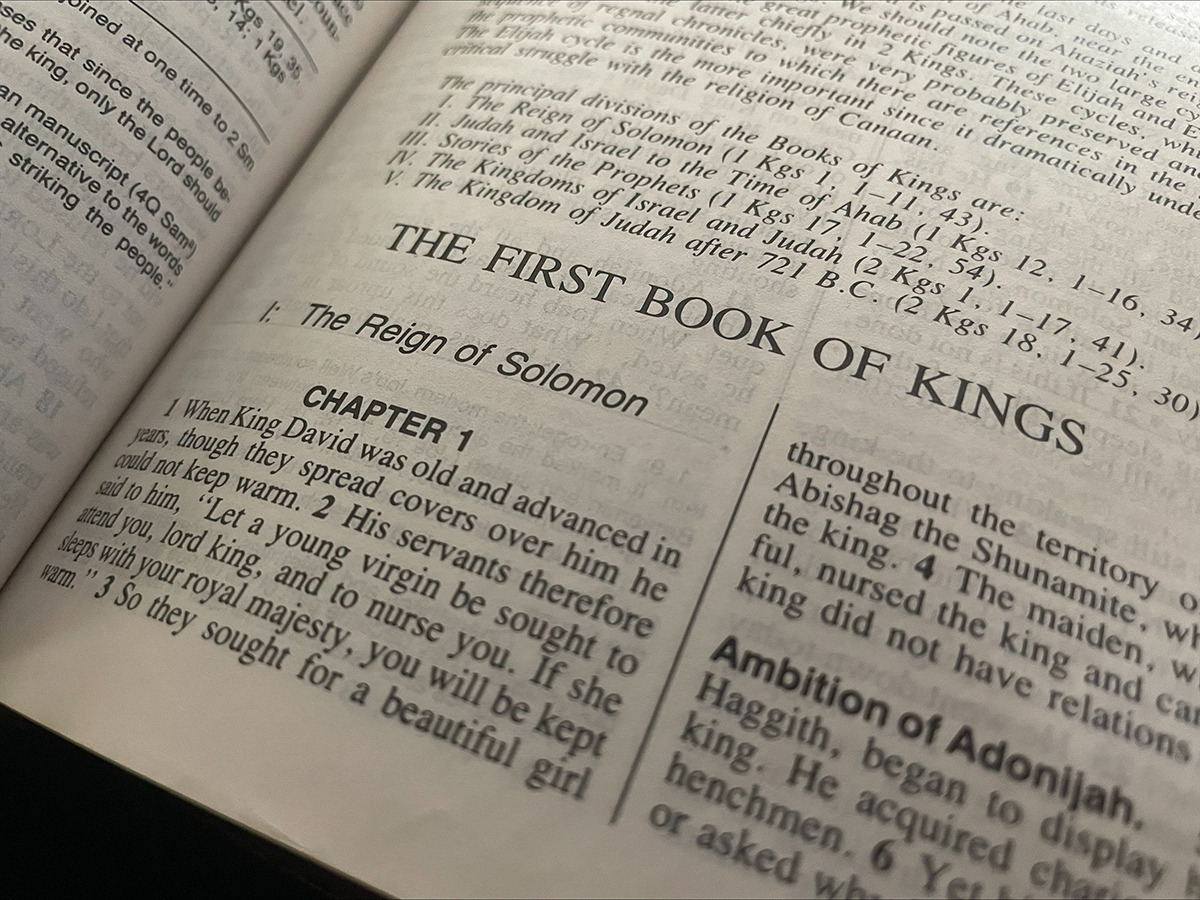Now King David was old, well on in years. They would cover him up, but he could not get warm. So his servants said to him, “My lord, the king, let a young virgin be found for you to attend to you and to care for you. She can lie alongside of you so that my lord, the king, can keep warm.” And so they searched for a beautiful young girl all throughout the territory of Israel, and they found Abishag the Shunamite, and they brought her to the king. The young woman was very beautiful, and she cared for the king. She served the king, but he did not have intimate relations with her (1 Kgs 1:4).
Why will Christians never hear this in a sermon? Because it is embarrassing, even repulsive to our sensibilities. It suggests human trafficking and shows the absolute power of elite entitlement. Abishag is summoned — not requested — and is given no choice. The king’s men become procurers of a young virgin who, in turn, understands her lack of options.
It is also a bleakly dreary reminder of the crumbling decay the human body endures as it succumbs to age. No one, not even the great high king of Israel, is immune. So it is also a tale of how the great David, so favored of the Lord, is reduced to a bag of shivering bones.
David is no longer the mythic figure Michelangelo so dramatically envisioned — defiantly naked, tight bodied, an example of muscular precision and arrogant confidence with a sling over his shoulder and prepared to meet unwary Goliath. Instead, this David is shambling in his unsteady gait, his vigorous stride reduced to a tentative shuffle and so worn by age he can never get warm. The story assaults our very being, our perception of ourselves as forever vigorous.
Imagine this story today. I see a lurid New York Post headline: “King David sleeps with a teenager.” His servants — acting as procurers — searched the kingdom and found a girl who was “very beautiful,” or as one translation put it, “stunning.” But would she have been unknown to the king? Stunning women did not usually pass the king’s eye. Ask Bathsheba.
Yet while Abishag tended to David’s needs the text explicitly states, “he did not have intimate relations with her.” This, should we wonder, is clearly not another Bathsheba incident. Besides, the king is in no position to be overcome by lust.
David had eight wives, Bathsheba most notably, plus a number of unnamed concubines, but the force of the translation suggests Abishag was more of a home health care worker than anything else. Tellingly, of all David’s wives and concubines, none was approached and none volunteered to tend to the old man’s needs, his hygiene and personal toileting and provide a nightly cuddle; wives and concubines had limits.
Eventually, Abishag becomes the reason Solomon orders the execution of his older half-brother, Adonijah.
While King David still lived — barely, it would appear — Adonijah tried to set himself up as king. He got some chariots and a royal mule, and had 50 armed men “to run ahead of him,” to the cheers of many. One might presume the armored men had something to do with Adonijah being hailed as king, here and there. Never once, the scriptural narrator off-handedly relates, did David ask Adonijah, “Just what do you think you’re doing?”
Here the Prophet Nathan steps in and then Bathsheba, herself. Together they confirm Solomon as David’s choice as his successor.
Adonijah’s men abandon him. The partiers he’d invited to his enthronement suddenly recall previous engagements. Adonijah sensibly panics and flees to the Tent of the Lord for asylum. From there, he seeks pardon from Solomon, which is granted.
That should be the end of that, but it isn’t. Adonijah sends Bathsheba to Solomon asking for Abishag as his wife. Solomon, suspicious of yet another coup attempt by Adonjiah, promptly has him “struck down.”
To emphasize the point, the narrator needlessly adds, “and he died.”
Now, what of Abishag? We don’t know. Never does the narrator let her speak for herself. Her life was Solomon’s. Perhaps at some point he found her a husband, or perhaps she was returned to her father. More likely she remained and Solomon determined her sexual fate, as he would with all the other women of his house.
Someone should tell HBO. “Game of Thrones” had nothing on ancient kings and biblical intrigue.
Russell E. Saltzman’s writing has appeared in numerous print and digital Catholic publications. A Lutheran pastor for 37 years, he became a Roman Catholic in 2016.












































